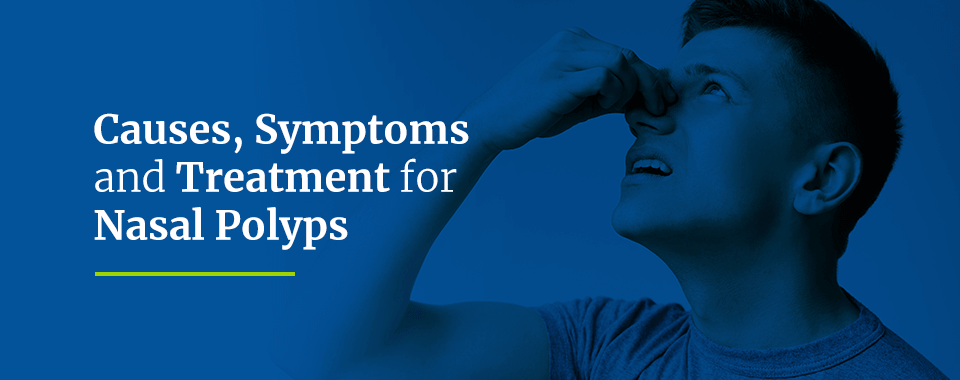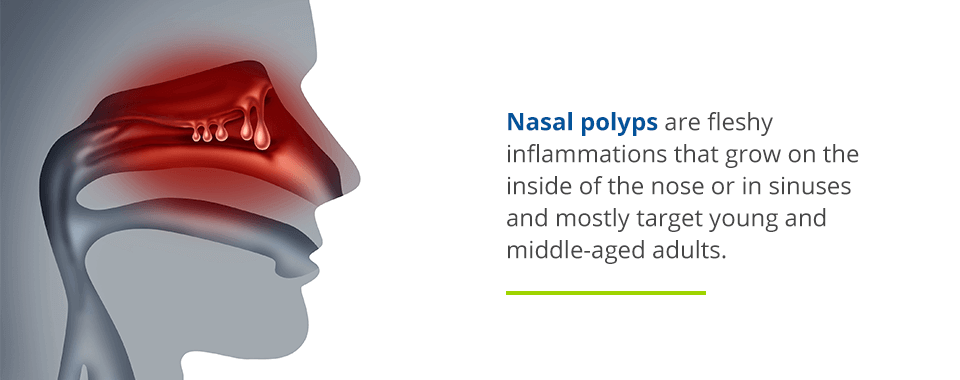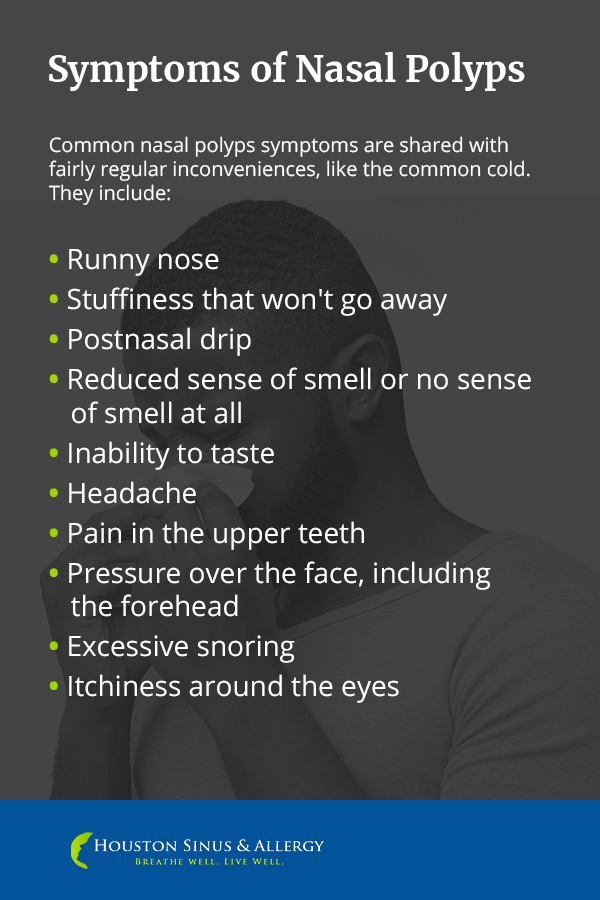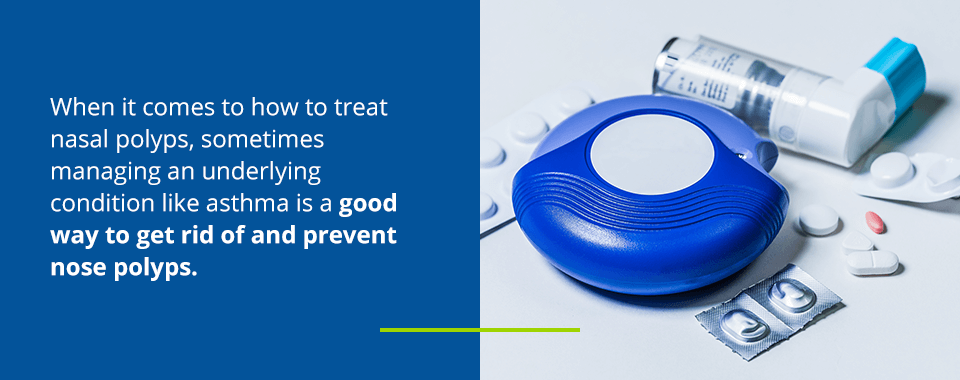
For some people, nasal polyps are asymptomatic and go unnoticed. For others, they can cause a lot of discomfort and frustration. The most agreed-upon figure for how common nasal polyps are is usually 4% of the population. That may sound like a small number, but 4% encompasses about 6.3 million people in the U.S. alone. Nose polyps may not require treatment if they’re small and aren’t causing symptoms. But if they are interfering with your nasal passage’s proper function, you may need medication and potentially even surgery.
Nasal polyps usually don’t do much more than hang out in our nose. However in some cases, they can grow so large that they interfere with breathing. As they continue to manifest over time, they can worsen. This is where a little foresight can save you a lot of discomfort down the road.
While treatment for nasal polyps is often successful and gets rid of them completely, they may come back again. That’s why it’s crucial to understand what they are and how to identify their symptoms.
- What are nasal polyps?
- What causes nasal polyps?
- Symptoms of nasal polyps
- How Long Do Nasal Polyps Last?
- Are nasal polyps contagious?
- How do you get rid of nasal polyps?
- Nasal polyps treatment and surgery
- Endoscopic surgery
- Septoplasty
- What happens if nasal polyps go untreated?
- Expert nasal polyp removal in Houston

What Are Nasal Polyps?
Nasal polyps are fleshy inflammations that grow on the inside of the nose or in sinuses and mostly target young and middle-aged adults. They can be small and grow on their own or form larger in bunches. They sort of look like a grape without its skin. Unlike other polyps, these are non-cancerous. While they can affect people of all ages, they’re far more common in adults over 40. They’re risky to leave untreated if they recur often and delicate to remove, so it’s important to take them seriously.
Our nostrils are lined with mucous membranes that work together with little hairs, called cilia, to trap bacteria and contaminants. These filters give the air a safe way to get to the lungs. Having these airways clear and healthy is important. A nasal polyp combats clearness by blocking the nasal passage with swelling.
If you constantly deal with a runny nose or nasal congestion that won’t clear up even after using over-the-counter medications, it’s a good idea to see a physician and confirm whether you’re dealing with nasal polyps.
What Causes Nasal Polyps?
While they’re very common among adults, many people are unaware that nasal polyps exist and may be growing inside their nasal passages. On top of that, many medical professionals aren’t completely sure of the causes of nasal polyps or why inflammation causes some people to develop nasal polyps but not others. What is confirmed is that nose polyps grow when there is irritation or swelling in the mucous membrane of the nose and sinuses, which is the part of your nose that creates the nasal fluid.
Nasal polyps in adults can be the result of several conditions relating to the nasal passage and sinuses. Nasal polyps in children could be a sign of cystic fibrosis. In fact, it’s estimated that up to 20% of children with cystic fibrosis deal with nasal polyps.
Some nasal polyps causes can include:
- Asthma
- Infection
- Allergies
- Sensitivity to certain drugs, like aspirin
- Some immune disorders
It’s safe to say that any condition where your nasal passage or sinuses are irritated can put you at risk for nose polyps. Genetics may also play a part in who has variations in their immune system that make them more likely to develop nose polyps.

Symptoms of Nasal Polyps
The tricky thing about nasal polyps is that the symptoms are so common. The growth isn’t painful to touch, and only in the most extreme cases does a polyp grow to a size that makes it peek out from under the nostril. By then, you definitely know something is amiss.
As mentioned, nose polyps have no sensation. If they’re small and unproblematic, they likely won’t result in any symptoms. However, they can grow larger. With the increased size, they pose the risk of interfering with your nasal passage and leaving you to suffer through chronic congestion. They can also affect your throat, especially if left untreated, which allows the blockage and congestion adequate time to spread.
Common nasal polyps symptoms are shared with fairly regular inconveniences, like the common cold. They include:
- Runny nose
- Stuffiness that won’t go away
- Postnasal drip
- Reduced sense of smell — or no sense of smell at all
- Inability to taste
- Headache
- Pain in the upper teeth
- Pressure over the face, including the forehead
- Excessive snoring
- Itchiness around the eyes
Nasal polyps rarely grow large enough to be seen, so the best way to tell if you may have them is to see a nasal polyps specialist.
How Long Do Nasal Polyps Last?
Nose polyps won’t go away on their own, so it’s important to recognize the symptoms. Since it can be difficult to tell if you’re dealing with simple allergies or nose polyps, it’s a good idea to see a nasal polyps doctor near you if your symptoms last for more than 10 days. A specialist will be able to examine your nasal passage, confirm whether you’re dealing with nasal polyps or something else and suggest the best way to treat the condition.
The doctor will ask you questions about your symptoms as well as your medical history, and they may order imaging tests like a CT scan. Usually, the doctor will be able to tell if you’re suffering from nasal polyps by inserting a special tool called an endoscope into your nostrils.
Unfortunately, nasal polyps will remain — and possibly grow — as long as the condition that caused them is present. Very large polyps can interfere with your health negatively. What is usually a harmless and temporary inconvenience can turn into a serious problem. Large polyps may even cause deformity. The face can appear enlarged as the small bones in the nose shift due to the growth. Although a rarity, the polyps can sometimes press on nerves and affect eyesight.
Are Nasal Polyps Contagious?
Nose polyps themselves aren’t contagious, but they can lead to the development of sinus infections, which can be contagious.
Polyp growth obstructs the nasal passage and sinuses, and when fluid is blocked in there, germs and bacteria can begin to grow and lead to a sinus infection. Sinus infections caused by bacteria growth — even if that bacteria was from nasal polyps blocking fluid — are not contagious. Only sinus infections caused by a virus are contagious.

How Do You Get Rid of Nasal Polyps?
It can be very tough to live with nasal polyps and discouraging when they recur regularly. Those who suffer from them can remain informed and tailor their actions to try to prevent nasal polyps from reoccurring. With that said, sometimes being careful and informed isn’t enough. If your breathing and health have become significantly affected by nasal polyps, you need to take things one step further.
Trying to handle nasal polyps on your own is not wise. With tons of information at your fingertips, an afternoon’s worth of reading can make you feel like an expert — but do you really want to mess around with something that affects your sense of smell and breathing?
A professional can give you a better idea of what’s going on in there, and save you a lot of painful poking around. The first line of defense is typically nose drops, sprays or tablets designed to reduce inflammation. These drops and tablets are typically steroids, which means they’re a great short-term fix, but the side effects may not be worth it in the long run. In other cases, a doctor may prescribe a one-week tapered course of oral corticosteroids, like prednisone.
Some common non-surgical options professionals may use to treat and remove nasal polyps include:
- Nasal corticosteroids
- Antibiotics
- Antihistamines
The unfortunate thing is that, even after successful treatment, there’s still a chance that nasal polyps will return. This is thanks to the fact that nasal polyps are a chronic condition and need consistent treatment to ensure they don’t get worse. A good way to prevent this from happening is to create an environment where it’s difficult for them to thrive. Avoiding extended exposure to irritants, properly managing asthma and ensuring you practice good hygiene are some simple ways to help keep your nasal passage and sinuses free of polyps.
When it comes to how to treat nasal polyps, sometimes managing an underlying condition like asthma is a good way to get rid of and prevent nose polyps. However, there are cases where non-surgical treatment proves inefficient and surgery becomes a viable option when considering how to remove nasal polyps.
Nasal Polyps Treatment and Surgery
Removing nasal polyps becomes a surgical matter when non-surgical treatments fail to get rid of them. It may seem drastic to operate on something that causes mild discomfort, but the truth is that the symptom list discussed isn’t a comprehensive list. While many of the symptoms of nasal polyps are difficult to differentiate from the average cold or allergy, larger polyps are hard to miss, mostly because they can really become a nuisance if left untreated. That’s why surgery is necessary when medication doesn’t work.
There are two surgical options for nasal polyp removal: functional endoscopic sinus surgery and septoplasty.
Endoscopic Surgery
Endoscopic sinus surgery is the most common option. In this surgery, the physician takes a small tool with a tiny camera — called an endoscope — and inserts it into the nostril. The physician will guide the endoscope to the area where the nose polyps are located in order to remove them and drain any fluid that’s backed up. They may also take this opportunity to enlarge the cavities to help reduce the severity of symptoms if the nasal polyps return.
Thanks to modern medicine and technological advancements, endoscopic sinus surgery is usually an outpatient procedure, which means the patient can go home right after. Because there is no need to make an incision in the face, the patient doesn’t have to deal with thick bandages over the nostrils afterward and can usually enjoy alleviated symptoms right away.
It’s extremely important to make sure you follow the physician’s advice regarding medications after the surgery. Usually, this will include corticosteroids or a saline nasal spray. Though the surgery will remove the polyps themselves, there still may be inflammation in the nasal passage or the sinuses. This will be treated with medication to reduce the inflammation and the chances of the nasal polyps growing again.
Septoplasty
A septoplasty is another option for surgical removal of nasal polyps and is better known as a surgery to fix a deviated septum. The cartilage of the septum, when crooked, can cause nasal problems. The goal of a septoplasty is to straighten the cartilage to help clear the nasal passage.
In a septoplasty, a physician will either make a small incision around the nostril or keep all incisions inside the nostril. Once the incision is made, the doctor will lift the mucus membrane sitting atop the cartilage to expose the cartilage and bone in order to reshape or remove it altogether. This is also when the doctor will remove any nasal polyps. Once the nasal passage is clear, the doctor will replace the mucus membrane with stitches and splints.
The surgery takes under two hours, and there will be cushioned packing in the nose for up to 24 hours. After that, the patient is able to return to everyday activities with some limitations to help the incision heal properly.
What Happens If Nasal Polyps Go Untreated?
Since so little is known about why nasal polyps grow in certain people’s nasal passages and not in others, it can be difficult to predict what will happen if nasal polyps are left untreated. While nasal polyps can grow and become a bigger obstruction, a study observing the long-term effects of untreated polyps found mixed results. The study concluded that though nasal polyps can get larger and grow in number, leading to more serious issues, untreated polyps can also remain inactive and cause no problems at all.
It’s always better to be safe than sorry — especially with something like nasal polyps, on which much research still needs to be done. Consistent symptoms of nasal polyps are annoying on their own and may hint at chronic issues, which should be dealt with sooner rather than later. And since the risk of nasal polyps evolving into more serious symptoms is a possibility, prolonged symptoms should be checked out right away.
Expert Nasal Polyp Removal in Houston
Nasal polyps are a nuisance, but they can be treated and removed using non-surgical methods. They can also occur in tandem with or as a result of more serious sinus issues, including infections or irritation from allergies. At Houston Sinus & Allergy, our ear, nose and throat professional, Dr. Nguyen, specializes in sinus treatments and can provide the help you need. From diagnosis to treatment, Dr. Nguyen offers quality care backed by more than 20 years of experience helping to relieve people of their sinus troubles.
Dr. Nguyen will examine your symptoms, check to see if it’s nasal polyps you’re dealing with and prescribe the appropriate medication to help control and remove the polyps. If surgery is necessary during the course of treatment, Dr. Nguyen can provide nasal polyp surgery in Houston in the clinic, so you don’t need to go to a hospital.
There’s no reason to suffer from breathing problems — including nasal polyps, disturbed sleep and frequent headaches. Book an assessment with Dr. Nguyen today and get started on the path to living without nasal discomfort.


Thank you l have a sister with nasal polpsy it’s been 2an half years now. Her health is deteriorate what can l do please help
Thank you l have a sister with nasal polpsy it’s been 2an half years now. Her health is deteriorate what can l do please help
[…] that suffer from effects of nasal polyps and congestion learn to endure the associated discomforts. Along with the obvious hurdles they may […]
[…] may be right for you. Our experienced ENT doctor specializes in sinus and allergy treatment, nasal polyps removal, and can help you find the relief you need. So book an assessment with us or contact […]
[…] airways in your nose. The surgery may also be done in order to allow access into the nose to remove nasal polyps, as an adjunct procedure to cure chronic […]
[…] main causes of sinusitis are bacterial infection and the growth of nasal polyps. The presence of both causes the tissues in the sinuses to swell up and mucous to fill up the […]
[…] Polyps in the nasal cavity […]
[…] who are sensitive to pollen, dust, spores and mold are prone to sinusitis. The growth of tumors, nasal polyps, and other impediments in the region can lead to problems as well, especially if the passages are […]
[…] should. There’s no shame in asking for help or medicine if it means getting better, whether its nasal polyps, colds or, other […]